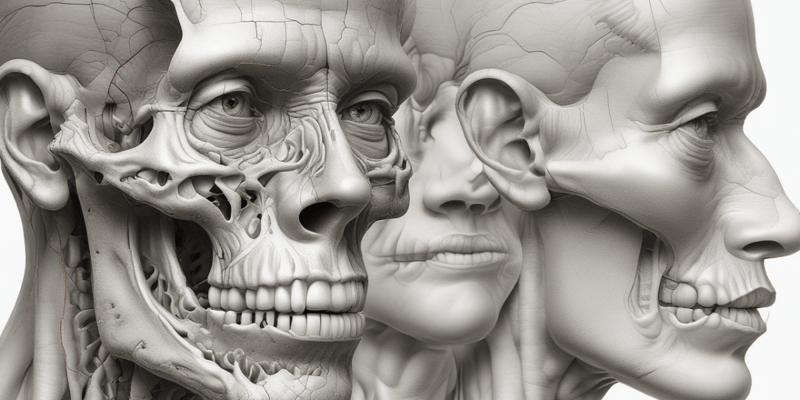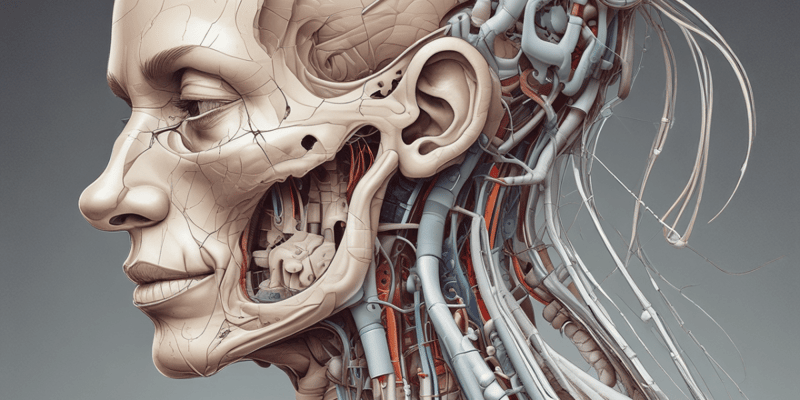Podcast
Questions and Answers
What is the main function of the nose in relation to breathing?
What is the main function of the nose in relation to breathing?
How many pairs of bones form the root of the nose?
How many pairs of bones form the root of the nose?
What is the main function of cilia in the nasal cavity?
What is the main function of cilia in the nasal cavity?
Which of the following arteries is NOT a major blood supply to the nose?
Which of the following arteries is NOT a major blood supply to the nose?
Signup and view all the answers
What is the function of the septal cartilage in the nose?
What is the function of the septal cartilage in the nose?
Signup and view all the answers
What is the term for the complex chamber located posterior to the vestibule and atrium of the nose?
What is the term for the complex chamber located posterior to the vestibule and atrium of the nose?
Signup and view all the answers
How many major cartilages form the dorsum and apex of the nose?
How many major cartilages form the dorsum and apex of the nose?
Signup and view all the answers
What is the term for the redirected pain sensation from the sinuses to other areas of the face?
What is the term for the redirected pain sensation from the sinuses to other areas of the face?
Signup and view all the answers
What is the primary function of the paranasal sinuses in terms of air?
What is the primary function of the paranasal sinuses in terms of air?
Signup and view all the answers
What type of epithelium lines the paranasal sinuses?
What type of epithelium lines the paranasal sinuses?
Signup and view all the answers
Which of the following sinuses is supplied by branches of the ophthalmic artery?
Which of the following sinuses is supplied by branches of the ophthalmic artery?
Signup and view all the answers
What is the name of the opening that connects the maxillary sinus to the nasal cavity?
What is the name of the opening that connects the maxillary sinus to the nasal cavity?
Signup and view all the answers
What is the primary function of the mucus produced by the paranasal sinuses?
What is the primary function of the mucus produced by the paranasal sinuses?
Signup and view all the answers
How do the paranasal sinuses develop?
How do the paranasal sinuses develop?
Signup and view all the answers
What is the function of the cilia in the paranasal sinuses?
What is the function of the cilia in the paranasal sinuses?
Signup and view all the answers
Which nerve supplies the maxillary sinuses?
Which nerve supplies the maxillary sinuses?
Signup and view all the answers
What nerve division provides general sensory supply to the nose?
What nerve division provides general sensory supply to the nose?
Signup and view all the answers
What separates the left and right nasal cavities?
What separates the left and right nasal cavities?
Signup and view all the answers
What is the function of the conchae in the nasal cavity?
What is the function of the conchae in the nasal cavity?
Signup and view all the answers
Which region of the nasal cavity is lined by olfactory epithelium?
Which region of the nasal cavity is lined by olfactory epithelium?
Signup and view all the answers
What is the sphenopalatine foramen connected to?
What is the sphenopalatine foramen connected to?
Signup and view all the answers
What is the purpose of studying the paranasal sinuses?
What is the purpose of studying the paranasal sinuses?
Signup and view all the answers
What is the function of the nasal cavity?
What is the function of the nasal cavity?
Signup and view all the answers
What drains into the lateral walls of the nasal cavity?
What drains into the lateral walls of the nasal cavity?
Signup and view all the answers
Which nerve supplies the frontal sinus?
Which nerve supplies the frontal sinus?
Signup and view all the answers
Which sinuses are supplied by branches of both maxillary and ophthalmic nerves?
Which sinuses are supplied by branches of both maxillary and ophthalmic nerves?
Signup and view all the answers
Why can maxillary sinus infections cause toothache?
Why can maxillary sinus infections cause toothache?
Signup and view all the answers
What is the term for an upper respiratory tract infection spreading to multiple sinuses?
What is the term for an upper respiratory tract infection spreading to multiple sinuses?
Signup and view all the answers
Why can an upper respiratory tract infection spread to the sinuses?
Why can an upper respiratory tract infection spread to the sinuses?
Signup and view all the answers
What is the term for inflammation of the mucosa in the sinuses?
What is the term for inflammation of the mucosa in the sinuses?
Signup and view all the answers
Why can an infection of the auditory tube lead to diminished hearing?
Why can an infection of the auditory tube lead to diminished hearing?
Signup and view all the answers
What percentage of people have the alveolar process of the upper molar teeth communicating with the floor of the maxillary sinus cavity?
What percentage of people have the alveolar process of the upper molar teeth communicating with the floor of the maxillary sinus cavity?
Signup and view all the answers
Following a facial injury, a patient presents with epistaxis. Which bone forms the posterior aspect of the nasal septum?
Following a facial injury, a patient presents with epistaxis. Which bone forms the posterior aspect of the nasal septum?
Signup and view all the answers
What is the typical cause of a nasal fracture?
What is the typical cause of a nasal fracture?
Signup and view all the answers
Which paranasal sinus provides access to the pituitary gland during surgical resection?
Which paranasal sinus provides access to the pituitary gland during surgical resection?
Signup and view all the answers
A patient suffers a facial injury during a rugby game. Which bone is most likely to be injured?
A patient suffers a facial injury during a rugby game. Which bone is most likely to be injured?
Signup and view all the answers
What is the name of the bone that forms the posterior part of the nasal septum?
What is the name of the bone that forms the posterior part of the nasal septum?
Signup and view all the answers
A patient presents with a pituitary adenoma. Which of the following is NOT a suitable approach for surgical resection?
A patient presents with a pituitary adenoma. Which of the following is NOT a suitable approach for surgical resection?
Signup and view all the answers
What is the primary mechanism of injury in a nasal fracture?
What is the primary mechanism of injury in a nasal fracture?
Signup and view all the answers
A patient presents with a nasal fracture following a sports injury. Which of the following bones is MOST likely to be injured?
A patient presents with a nasal fracture following a sports injury. Which of the following bones is MOST likely to be injured?
Signup and view all the answers
Study Notes
Nose Anatomy
- The nose is located inferiorly and medially to the eyes and has three main functions: breathing, olfaction, and removing pathogens and particulates.
- The nasal cavity is a complex chamber located posterior to the vestibule and atrium of the nose, consisting of pseudostratified epithelium and cilia.
- The root of the nose is made up of three pairs of bones: frontal (nasal process), maxilla (frontal process), and nasal.
- The dorsum and apex of the nose are formed by three major cartilages: septal, lateral nasal (upper nasal), and major alar (lower nasal).
Nasal Cavity Boundaries & Relations
- The nasal cavity has three regions: vestibule, respiratory, and olfactory.
- The vestibule is lined by skin and houses hair follicles.
- The olfactory region is the most superior part of the cavity space, lined by olfactory epithelium and contains olfactory receptors.
- The respiratory region is lined by respiratory epithelium and has three large elevations, known as conchae, which protrude from the lateral wall.
- The paranasal sinuses and the nasolacrimal duct drain into the lateral walls of the nasal cavity.
Paranasal Sinuses
- The paranasal sinuses are paired, hollow cavities enclosed in skull bones, covered by mucus and cilia, and connected to the nasal cavity through passages and apertures called ostia.
- They are lined by respiratory epithelium (pseudostratified columnar epithelium) and have openings that communicate with the lateral wall of the nose.
- The paranasal sinuses include the frontal, maxillary, ethmoidal, and sphenoidal sinuses.
Innervation and Blood Supply
- The nasal cavity receives general sensory supply from branches of the ophthalmic (nasociliary) and maxillary (nasopalatine) divisions of the trigeminal nerve.
- The frontal sinus is supplied by branches of the ophthalmic artery.
- The maxillary sinuses are supplied by branches of the maxillary artery.
- Ethmoidal and sphenoidal sinuses are supplied by branches of both maxillary and ophthalmic arteries.
- The ophthalmic nerve, maxillary nerve, and sphenopalatine ganglion are involved in the innervation of the paranasal sinuses.
Clinical Relevance
- Sinusitis can occur when an upper respiratory tract infection spreads to the paranasal sinuses, causing inflammation and pain.
- Maxillary sinus infections can cause toothache due to the proximity of the maxillary sinus to the upper teeth.
- The alveolar process of upper molar teeth can be very close to the floor of the maxillary sinus cavity, allowing infection to spread between the two.
- Ear infections can occur when the auditory tube becomes blocked, causing diminished hearing.
Studying That Suits You
Use AI to generate personalized quizzes and flashcards to suit your learning preferences.
Related Documents
Description
Test your knowledge on the anatomy of the nose and paranasal sinuses, including bones, nasal cavity, septum, conchae, and sinus drainage. Identify the positions and functions of each paranasal sinus and their relationships to the nasal cavity. Learn about the different hypotheses of sinus development.




